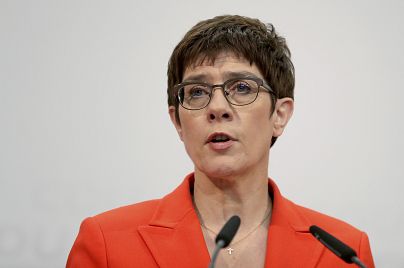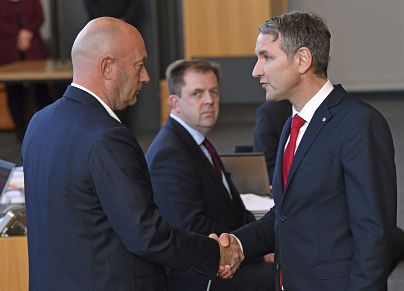Even if it was short-lived, the election of a governor with far-right votes is likely to have a longlasting impact in Germany.
Even if the political crisis was short-lived, the election of a governor with far-right votes in Thuringia is likely to have a longlasting impact on Europe's largest economy.
Thomas Kemmerich, of the small pro-business Free Democrats (FDP), was appointed as governor of the eastern state on Wednesday with the support of the far-right Alternative for Germany, or AfD.
He announced his resignation just a day later after Chancellor Angela Merkel called the alliance 'inexcusable' and asked for the vote to be reversed.
But his resignation doesn't end the political deadlock in Thuringia just yet, and the affair will continue to have broad longterm repercussions on German politics.
Euronews looks at the next steps for Thuringia and Germany after an episode that has shaken up the country's political taboos.
Are snap elections inevitable in Thuringia?
German politics expert Rüdiger Wurzel, a professor at the University of Hull, told Euronews that new elections in Thuringia were the most likely option even if Merkel's Christian Democratic Union (CDU) party was currently exploring other alternatives.
When she gathered the CDU leadership for a crisis meeting on Friday, party leader Annegret Kramp-Karrenbauer called on centre-left parties to present a candidate "who doesn't divide the state.''
"But I would be surprised if they did," Wurzel told Euronews, considering the Social Democrats and the Greens in Thuringia formerly supported far-left party Die Linke.
"If no solution can be found, new elections are inevitable,'' Kramp-Karrenbauer said.
But Wurzel said the CDU preferred avoiding a new vote because it would be "the biggest loser" of a snap election.
A poll published Friday suggested that CDU support could collapse in the state.
"Over two-thirds of members of parliament would have to agree to fresh elections," noted German politics expert Hartwig Pautz, a lecturer at the University of the West of Scotland. "Red/red/green does not have that majority and the CDU have said they are against fresh elections in which they have reason to worry about losing further seats," he said.
What's the impact for Merkel's CDU ?
Experts say the crisis has challenged the authority of Annegret Kramp-Karrenbauer, who succeeded Merkel as CDU leader in 2018, while giving ``the impression that the party in Berlin has no influence in the state.
Kemmerich was backed by the local branch of CDU, which ignored a recommendation from Berlin not to support the liberal/far-right alliance.
Merkel's party has yet to decide who will run to succeed her. "Kramp-Karrenbauer has to get out of this undamaged if she wants to be chancellor," Wurzel told Euronews.
The Thuringia debacle also highlighted the dilemma of a party that long said it would not ally with either AfD or Thuringia's popular previous far-left governor, Bodo Ramelow. The Christian Democrats shun the Die Linke as a descendant of communists who controlled East Germany.
A small faction in the CDU has advocated a more relaxed approach to AfD.
"Participants at Friday's party meeting agreed unanimously that ``for the CDU in Germany and the CDU in Thuringia, it is still the case that there will be no cooperation with AfD, either directly or indirectly,'' Kramp-Karrenbauer said.
Is the ruling coalition endangered?
Leaders from Merkel's often-tense national coalition with the centre-left Social Democrats (SPD) are to meet on Saturday to discuss the Thuringia crisis.
The SPD was appalled by the alliance with the far-right in the state, Wurzel explained.
"It would have been quite a coup for the AfD not only to help to elect for the first time a Prime Minister in a German state but also to manage also to break up the grand coalition between the CDU/CSU and the SPD at the federal level," Wurzel noted.
Keeping SPD happy is one of the reasons why Merkel has taken such a strong stance against the alliance with the far-right when she spoke on Thursday, Wurzel told Euronews.
The immediate danger of a coalition breakup has passed, Wurzel said, but it could return depending on how the CDU handles the situation.
According to Pautz, however, "the SPD is unlikely to break up the federal coalition over the episode, as it would stand to win nothing."
Will AfD benefit from the episode?
"The AfD in Thuringia has under Björn Höcke’s leadership become very/extremely right-wing. It is one of the reasons why the election of a Prime Minster in Thuringia with the help of the AfD has attracted so much attention in Germany and abroad," Wurzel said.
The expert thinks the far-right party will benefit from the episode, at least in the state of Thuringia.
According to Pautz, the ensuing uproar, far from harming AfD, may even galvanise its supporters.
"The continued ostracising of the AfD, by the established parties, has always played out quite well for the far-right party," Pautz told Euronews
"Drawing parallels with the historic Nazi party seems less than helpful when dealing with the far-right's demagoguery, its politics and policies in the context of contemporary German politics," the lecturer said.
The question is whether Thuringia was a one-off or if it has set a precedent, Wurzel told Euronews.
But Pautz said he did not see the "firewall" against the AfD by established mainstream parties "crumbling any time soon," noting that the situation in Thuringia happened "by accident" given how the FDP’s federal chairman has apologised over his party’s behaviour in Thuringia and considering the governor's resignation.













